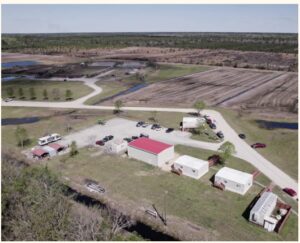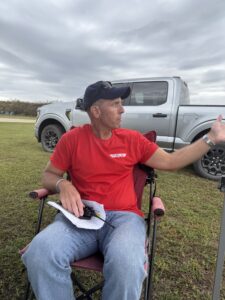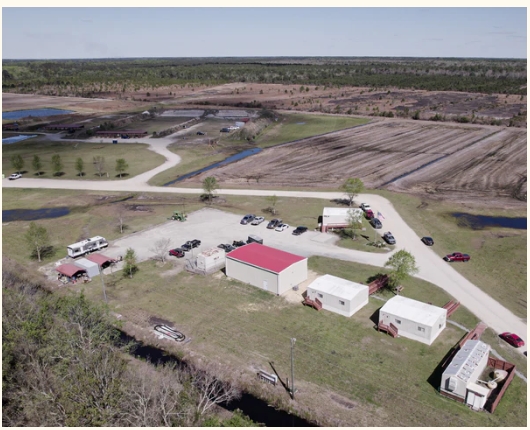Last week, I was in Autryville, watching a drone competition. That is misleading. I was maybe five miles from Autryville. The place I was at, known as TRC — which stands for “The Range Complex” — has an Autryville address. Autryville is in Sampson County, barely. We were in rural eastern Cumberland County.
Normally, when I am in Cumberland County, I am visiting the Army and Fort Bragg, which is the economic engine that has driven Fayetteville and the surrounding counties for a century. Where I was for the drone competition was a little less than 20 miles east of Fort Bragg, across I-95.
If you are going to fly a lot of drones, it helps to be away from things. When I left the paved highway and swung onto the gravel road into The Range Complex, the road went on and on, through fields and woods.

I had come to this place, along with some 170 other folks, because drones have become very important. The Senate just passed its draft of the National Defense Authorization Act that mentions the word “unmanned” 126 times, more than three times the number in the 2010 version. Sikorsky just rolled out an unmanned Black Hawk helicopter, which must thrill the pilots at the 82nd Combat Aviation Brigade. Yesterday’s email newsletter from “Breaking Defense” was headlined “Drones dominate AUSA 2025.”
I didn’t know, in 2020, that this would be the Decade of the Drone. And connected to that, the Decade of Artificial Intelligence.
A couple of things happened, both in 2022, as accelerants. Russia invaded Ukraine in February 2022, and both sides started fighting a massive drone war. It has had a big influence on military thinkers around the globe. In November 2022, OpenAI released ChatGPT, and those of us who aren’t data scientists realized the potential of artificial intelligence. You can draw more or less straight lines from these two events, and me being in eastern Cumberland last week.
FCEDC event
The event was organized by the Fayetteville Cumberland County Economic Development Corporation, and in the middle of all the activity, coordinating things, were the president, Robert Van Geons, and executive vice president, Rob Patton.

Patton shared his bug spray with me. As a retired Army colonel, he has spent time on ranges and came prepared. I wasn’t. I talked to him about the two-day event.
The goal was to bring together military folks, academic researchers, and innovative companies at a place where drones could fly around and do a lot of different things. For a lot of reasons, that’s not easy to do on military installations, even a place as big as Fort Bragg. Just getting folks through the gates of an installation is a challenge because of security. And flying any kind of unmanned aircraft on a base is not easy, especially lately, what with strange drones buzzing installations.
This was a good time to hold last week’s inaugural drone competition at The Range Complex.
There are more opportunities to do business with military installations that want to experiment with unmanned aircraft, Patton noted. The Department of War has loosened drone policy for commanders at the O-6 level — Army and Marine colonels and Navy captains. As one trade publication put it recently: “One of the biggest changes gives military commanders more freedom to buy drones. Officers at the colonel level can now authorize their people to operate drones and buy, test, and train with small uncrewed aircraft systems. This is a major shift from the old system, where higher-level approval was needed.”
“One of the thought processes is a lot of these folks out there are doing some pretty innovative things on their own, as well as industry and academia,” said Patton, so it is useful to bring them together at a place like TRC so the military can see something and say, maybe make this or that change.
“That gives innovators six months to develop what the military is looking for. We do it again. They come out, test it out. The next one, they say, ‘Hey, I like it.’ They can buy it.”
As we talked, drones were flying around different ranges, over and around obstacles, around shoot houses and other buildings. The event drew folks from far away. There were folks from Canada and Taiwan. There was a group from Purdue University.
The Complex
I had a chance to learn about The Range Complex (below) talking to Bryan Bailey, the president, a retired Fayetteville police sergeant who was a team leader on the department’s Emergency Response Team, lead Police Academy instructor and a 14-year TRC instructor. And an NC State electrical engineer.
The Range Complex had its origins as a part of TigerSwan, an Apex-based global security firm founded in 2008 by retired U.S. Army lieutenant colonel and Delta Force operator James Reese. Over the past 15-plus years, TigerSwan has been awarded government contracts worth around $28 million, mostly from the State Department and the Army, but also from the U.S. Special Operations Command.
The Range Complex was sold off as a separate entity in 2014. Its customers include the military and police departments and companies that want to test out things like drones and ground vehicles. Families can come out and use ranges for shooting practice.
It is a good place to demonstrate things to potential customers.
To give you some idea, this is how one national publication described a visit to The Range Complex eight years ago:
“The United States Special Forces are perhaps the best tactical fighting force the world has ever seen. Whether it’s hostage rescue, covert operations, or a Bin Laden-esque kill-or-capture mission, the Tier 1 Operators of the US military are the ones to beat. As any Boy Scout can tell you, being prepared is the key to success. For these operators, it’s about having the best training, the best intelligence, and the best equipment — whether it’s $40,000 night vision goggles that turn night into day or $60,000 blacked-out SUVs.
“That last bit is why Chevrolet invited a small group of journalists to Fayetteville, North Carolina, home of Fort Bragg and the Joint Special Operations Command that oversees the Army’s Delta Force and several other elite units. The carmaker’s PR machine wanted to show how some former operators — the preferred term for members of the most elite special forces units in the US — use the Chevy Tahoe and Suburban SUVs in environments a bit more challenging than your typical Whole Foods grocery run.
“Our destination was The Range Complex, a shooting range and training facility just outside Fort Bragg that’s owned and operated by former Delta Force members. It’s a firearm enthusiast’s dream on 1,982 acres (8km2), complete with tactical pistol and rifle ranges out to 100 yards (91m), a 600-yard (549m) long-distance rifle range, a 50-yard (46m) competition training range, and a pair of live-fire shoot houses complete with multiple rooms and an overhead catwalk for instructors to supervise activities.”
————————————
So that’s where we were at. If you want to know more, here’s a video of Bailey and Reese, talking about the facility.
Some of the visitors
I was sitting talking with Patton when Vivien Yang joined us and sat down. She is the co-founder and CEO of a Taiwanese battery company, VoltaSphere Technology. She is looking for a place to set up production in the U.S. Batteries are crucial components for drones and other unmanned things.
A big part of China’s technological and manufacturing advances in recent decades has been due to Taiwanese companies, like Foxconn. This is one of the complexities of the China narrative-Taiwan for Americans. Even though we spend a lot of time focusing on whether China will try to seize Taiwan by force, the parallel reality is also that Taiwanese companies have been deeply responsible for China’s industrialization for years. Foxconn was the key to Apple’s iPhone manufacturing success on the mainland.
But increasingly, Taiwan has had to hedge its bets. Taiwan has a vastly greater understanding of China than we do, but it is still hard for Taipei to predict what Xi Jinping will do in, say, 2027. Taiwanese business folks like Yang have to navigate this uncertainty, and so she was in Cumberland County last week, talking to drone innovators.
“Our project is basically to do a China 2.0 in the US,” she told me. “So some of our shareholders, they have, like I just mentioned, they had a battery pack plant in China supplying batteries for commercial EVs in the US. So the customers were American, and it became really obvious back in ‘22, ‘23 [of the need] to move out of China. So the customers were like, ‘OK, come move to the US, set up a production plant, because the U.S. really, really needs batteries.’”
I also met some Canadians at the event, from a company called Quanser, located in Markham, a techie suburb of Toronto. Quanser’s business is helping colleges set up their drone programs. There are a lot of colleges scrambling to set these up, but it isn’t easy. You need to equip classrooms and workspaces, and pull together instructional materials. A professor who had to do all this for his own course realized that this could be a business. Patrick Barnard, one of the Quanser reps, explained it to me.
“And so if a professor buys a control studio to teach controls, they also don’t have to go and design all their own lab content and all that. It’s really out of the box.”
What I learned at The Range Complex is that the emergence of a domestic, military-compliant drone industry requires a complex ecosystem. You need battery manufacturers, scientists and engineers, training infrastructure and accessible places to fly them. There’s a lot more to the drone industry than just drones.

